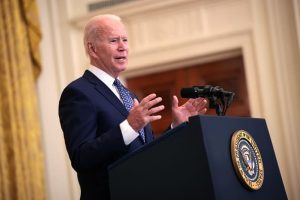U.S., Australia and UK unveil new security partnership as China expands its military and influence

- A new security partnership between the U.S., Australia and the U.K. seeks to strengthen stability in the Indo-Pacific region as China expands its military might and influence.
- The U.S. and U.K. will also assist Canberra in acquiring nuclear-powered submarines, which will allow Australia's navy to help counter Chinese nuclear-powered vessels in the region.
- A senior Biden administration official downplayed the notion that the new security partnership sought to send a message specifically to China.
WASHINGTON – President Joe Biden announced the formation of a new security partnership between the United States, Australia and the United Kingdom that seeks to strengthen stability in the Indo-Pacific region as China expands its military might and influence.
Prime Ministers Scott Morrison of Australia and Boris Johnson of the United Kingdom joined Biden virtually for the announcement of the partnership.
"Today we're taking another historic step to deepen and formalize cooperation among all three of our nations because we all recognize the imperative of ensuring peace and stability in the Indo-Pacific over the long term," Biden said from the East Room of the White House. "This is about investing in our greatest source of strength, our alliances," Biden said.
"This initiative is about making sure that each of us has the most modern capabilities we need to maneuver and defend against rapidly evolving threats," the president said.
The formation of the trio comes as the U.S. and U.K. end their 20-year military involvement in Afghanistan, a decision Biden has said will allow the U.S. to focus on emerging threats from Russia and China.
The U.S. and U.K. will also assist Canberra in acquiring nuclear-powered submarines, which will allow Australia's navy to help counter Chinese nuclear-powered vessels in the region.
"This will give Australia the capability for their submarines to basically deploy for longer periods, they're quieter, they're much more capable, they will allow us to sustain and to improve deterrence across the Indo-Pacific," a senior administration official, who spoke on the condition of anonymity, said ahead of the president's remarks.
"What we're seeing in the Indo-Pacific region is a set of circumstances where capabilities are more advanced," the official added. "This allows Australia to play at a much higher level, and to augment American capabilities."
The U.S., Australia and the U.K. also plan to deepen technology sharing across emerging security arenas like cyber, artificial intelligence and quantum technologies. The three countries alongside Canada and New Zealand already share extensive intelligence through the Five Eyes alliance.
Biden's approach to China
The administration official downplayed the notion that the new security partnership sought to send a message specifically to China.
"I do want to just underscore very clearly this partnership is not aimed or about any one country, it's about advancing our strategic interests, upholding the international rules-based order and promoting peace and stability in the Indo-Pacific," the official said.
Yet the announcement of the security partnership focused on the South Pacific-Indian Ocean region comes as Biden attempts to reframe the United States approach to the Chinese government in the wake of the Trump administration's trade war and as the world continues to grapple with the Covid pandemic, which originated in Wuhan, China.
Biden, who spoke to Chinese President Xi Jinping last week, has previously said that his approach to China would be different from his predecessor's in that he would work more closely with allies in order to mount pushback against Beijing.
The Pentagon is also moving to contend with the rapid expansion of China's military.
Earlier this year, Defense Secretary Lloyd Austin directed the Pentagon to place China and its military buildup at the center of American defense policy.
"This directive from the Secretary is ultimately about getting the Department's house in order and ensuring that the department lives up to the stated prioritization of China as the No. 1 pacing challenge," a senior Defense official, who spoke on condition of anonymity, said in June.
Source: Read Full Article
